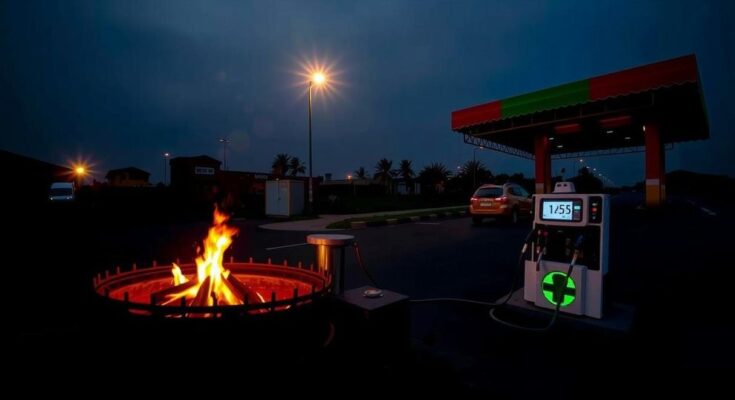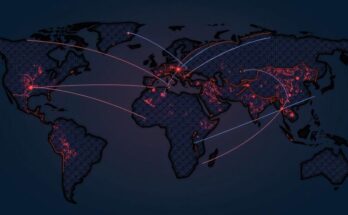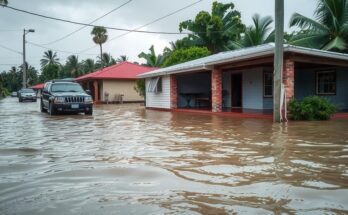The South Sudan Revenue Authority has suspended the E-petroleum Accreditation Permit fee, following backlash from businesses and NGOs who deemed it illegal and detrimental to the struggling economy. The levy, introduced in March 2024, significantly increased operational costs for fuel imports, thus threatening essential supplies to South Sudan. The SSRA will now absorb these costs after widespread complaints about the impacts on commodity prices.
The suspension of a contentious fuel levy in South Sudan marks a significant shift in the realm of petroleum taxes aimed at imports from Kenya. The South Sudan Revenue Authority (SSRA), in response to widespread grievances from various stakeholders including businesses and international aid organizations, has put a halt to the E-petroleum Accreditation Permit fee that was introduced in March 2024. This levy drew severe criticism for being deemed both illegal and an excessive financial burden, thereby aggravating the struggles of South Sudan’s faltering economy. The increase in operational costs directly affected fuel prices, raising concerns about the potential disruption of crucial humanitarian supplies to the region. The controversy surrounding the levy primarily involved Crawford Capital International Ltd and its subsidiary, Capital Pay Ltd, which were designated by the South Sudanese government to enforce these fees at Kenyan exit points. Allegations arose highlighting the exploitation of importers and exporters due to inflated charges for the accreditation permits and fuel marking services necessary for trucks transporting fuel to Juba. In an official letter dated October 5, 2024, the SSRA called for the immediate suspension of all associated charges while maintaining that the accreditation certificate should remain mandatory but free of cost. Commissioner Daniel Kon Ater emphasized that the SSRA’s decision stems from the detrimental impact the levy has on the market prices of goods, adding that the government will absorb the costs as outlined in an earlier agreement focused on food supply logistics to South Sudan. The contentious charges, originally set at $0.05 per litre, were later adjusted to $0.03, significantly affecting the economics involved in fuel transportation—culminating in nearly $1,944 cost burden for each 36,000-litre truck. Despite a previous court ruling upholding the implementation of the levy, the revenue from these fees, intended for supporting the operations of Crawford Capital Ltd, has come under scrutiny in ongoing legal challenges. The Kenya Revenue Authority reinforced the appropriateness of Crawford’s role in customs and fee collection related to fuel imports. Furthermore, concerns have been expressed regarding the impact of these charges on the operations of related companies, including the Kenya Pipeline Company, which found the additional levies to be detrimental to its business prospects.
The backdrop to this situation involves South Sudan’s fragile economy and its reliance on fuel imports from neighboring Kenya. The introduction of the E-petroleum Accreditation Permit fee was a government attempt to regulate and facilitate fuel imports; however, this measure sparked significant backlash. Importers, exporters, and humanitarian organizations argued that the levy not only contravened legal stipulations but exacerbated financial strain on an already vulnerable economic framework. The government’s engagement with private entities like Crawford Capital International Ltd to execute these fiscal measures raised further questions regarding transparency and accountability in fee imposition. The economic landscape for South Sudan is particularly precarious, with rising commodity prices adversely affecting the movement of essential supplies, which is crucial for both humanitarian efforts and the general populace. Stakeholders, including those within the Kenyan border whose operations intersect with South Sudan, voiced concerns regarding the potential adverse effects this levy would have on trade and aid distribution.
In conclusion, the suspension of the E-petroleum Accreditation Permit fee by the South Sudan Revenue Authority reflects a necessary reevaluation of fiscal policies affecting fuel imports from Kenya. The backlash against the levy highlights significant economic challenges faced by South Sudan and underscores the importance of stakeholder input in shaping effective and sustainable fiscal strategies. The commitment by the government to assume the costs associated with the accreditation process, while maintaining regulatory scrutiny, may foster a more conducive environment for both local businesses and humanitarian efforts going forward.
Original Source: www.theeastafrican.co.ke




